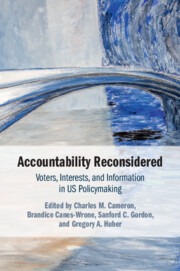Book contents
- Frontmatter
- Dedication
- Contents
- Figures
- Tables
- Contributors
- Acknowledgments
- 1 Introduction
- Part I Candidate Evaluation and Selection
- Part II The Media and The Informational Environment
- Part III Policymaking, Information Provision, and Accountability
- 9 Coalition Leadership in the Polarized Congress
- 10 Fire Alarms and Democratic Accountability
- 11 Achieving Accountability: Aligning Institutions and Behavior
- Part IV Outside The Public Eye? Private Interests and Policymaking
- Bibliography
- Author Index
- Subject Index
10 - Fire Alarms and Democratic Accountability
from Part III - Policymaking, Information Provision, and Accountability
Published online by Cambridge University Press: 09 February 2023
- Frontmatter
- Dedication
- Contents
- Figures
- Tables
- Contributors
- Acknowledgments
- 1 Introduction
- Part I Candidate Evaluation and Selection
- Part II The Media and The Informational Environment
- Part III Policymaking, Information Provision, and Accountability
- 9 Coalition Leadership in the Polarized Congress
- 10 Fire Alarms and Democratic Accountability
- 11 Achieving Accountability: Aligning Institutions and Behavior
- Part IV Outside The Public Eye? Private Interests and Policymaking
- Bibliography
- Author Index
- Subject Index
Summary
Charles Cameron and Sanford Gordon continue the focus on governance by studying the incentives facing elected officials when voters rely on challengers and interest groups – ---"sentinels” – ---to sound “fire alarms” about incumbent behavior. The authors find that three factors affect the impact of sentinels: the verifiability of fire alarm information, potentially a critical issue in the age of “fake news”; the incentives of sentinels to withhold information, either to make incumbents look bad or to advance favored policies; and the ability of incumbents to counter sentinel bias through credit-claiming. Importantly, the presence of sentinels can lead incumbents to reduce the chance of bad news even at the expense of voter welfare, a perverse effect not fully eliminated by incumbent credit-claiming. The authors illustrate these insights with a case study of changes in the politics of criminal justice. The chapter concludes that fire- alarm oversight of incumbent politicians sometimes helps voters, but its potentially perverse effects render it a distant second -best to a fully informed electorate in ways that imply the media effects studied in Part II strongly affect elected officials.
Keywords
- Type
- Chapter
- Information
- Accountability ReconsideredVoters, Interests, and Information in US Policymaking, pp. 221 - 241Publisher: Cambridge University PressPrint publication year: 2023
- 1
- Cited by

